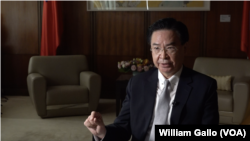Taiwan’s foreign minister said Friday that additional foreign delegations are “more than welcome” in Taipei, insisting his government will not be deterred by China’s furious reaction to last week’s visit by U.S. House Speaker Nancy Pelosi.
In an exclusive interview with VOA, Foreign Minister Joseph Wu also criticized China’s military exercises held in response to Pelosi’s visit, accusing Beijing of “wrecking the status quo” in the Taiwan Strait.
Wu said Taiwan will not be prevented from conducting its own foreign policy.
“We need to remember that if we are doing the right things, the Chinese anger should not stop us from doing so," Wu said. “They can always find excuses to threaten Taiwan militarily," he added.
After Pelosi’s visit, China surrounded Taiwan for several days with unprecedented, large-scale military exercises. Chinese state media described the drills as rehearsals to invade or blockade the island.
However, China’s response does not appear to be deterring visits by similar high-level foreign delegations that want to show support for the democratically run island.
A senior group of British lawmakers plans to visit Taiwan later this year, according to The Guardian. U.S. House Minority Leader Kevin McCarthy also recently said he would visit Taiwan as House speaker, if his Republican Party wins November midterm elections.
“Anyone who wants to come to Taiwan to show their support, they are more than welcome to visit us,” Wu told VOA during the interview at Taiwan's Foreign Affairs Ministry.
U.S. congressional delegations routinely make solidarity trips to Taiwan, though Pelosi’s visit was the first by a U.S. House speaker in 25 years.
China views such shows of support as violations of its sovereignty. It says Taiwan has been a part of China for hundreds of years and does not rule out force to retake it, even though the Chinese Communist Party has never ruled the island.
Rejection of China's claims
China has long proposed a “one country, two systems” policy for Taiwan, which would theoretically provide the island more autonomy following a hypothetical unification with China.
But earlier this week, China's government released a white paper indicating Beijing would offer even less flexibility to Taiwan than promised earlier.
The white paper, the first of its kind in about two decades, outlines the policies that China envisions for Taiwan.
Past versions of the document have included a line saying China would not send troops or administrative personnel to Taiwan after reunification. That line was removed in the latest iteration.
The document did not renounce the use of force to retake Taiwan but said China prefers to unify peacefully. It also vowed Taiwan would maintain its “current social system” and a “high degree of autonomy.”
The white paper “reiterates lots of statements or principles that the Taiwanese people have no interest in,” said Wu, calling the one country, two systems proposal a “fantasy.”
“That kind of idea has been destroyed – totally destroyed – by the way the Chinese government is treating Hong Kong,” Wu added.
China also promised a “high degree of autonomy” to Hong Kong when it retook the former British colony. But a wide-ranging national security law China imposed in 2020 largely eroded freedoms there.
“The people here in Taiwan watched it and…know that that is something we don’t want to accept,” Wu said.
Just 1.6% of Taiwanese support unification with China, according to an opinion poll conducted in November. An overwhelming majority also said they oppose declaring independence, with 85% saying they support maintaining the status quo.
With Taiwanese public opinion firmly set against Beijing, some Chinese diplomats are resorting to threats. Earlier this month, China’s ambassador to France, Lu Shaye, told a French television program that China would impose “re-education” programs to instill loyalty after China takes Taiwan.
The proposal prompted a mixture of anger and amusement in Taiwan, where residents have long dealt with China’s threats. Asked about Lu’s comment, Wu said Taiwanese citizens will “laugh him out of town.”
“Freedom and democracy have become part of our lives. And we believe in that. If the Chinese government wants to change that, the Taiwanese people are going to say no way,” he said.
The Taiwanese people, he said, understand China “is becoming very provocative and very reckless” in its actions toward Taiwan.
China ‘wrecking the status quo’
Although China announced an end to the military drills earlier this week, Wu said the threat remains, noting that Chinese fighter jets continue to cross the so-called median line in the Taiwan Strait.
The median line, which serves as a de facto sea border, has for decades “safeguard[ed] peace and stability,” according to Wu. Recent provocations near the line are a “clear sign of China wrecking the status quo,” he said.
Observers are watching closely to see if China continues median line incursions and other provocations in the coming months. If China were to regularize its military presence closer to Taiwan, it would increase the chance of miscalculation and might result in less strategic space for Taiwan’s military to maneuver.
During China’s recent drills, U.S. aircraft carriers and other military assets have stayed relatively far away. Pentagon officials have emphasized de-escalation, saying they do not want a war to break out. But that approach has allowed China's military to get closer than ever to Taiwan, some Taiwanese analysts warn.
While Taiwan "does not want to give an inch" to China, Wu said he understands the U.S. decision to stay calm. “We are doing the same thing. We are not trying to provoke China,” he said. “We will stay calm, and we will stay confident at the same time. We want to be a responsible stakeholder in this region.”




